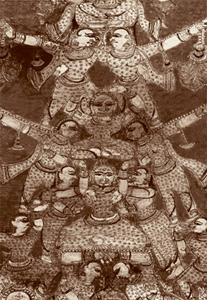Conduct of the ladies of the inner court

Antahpurikavritta Prakarana

 he women of the royal house are strictly guarded, and cannot see or meet any other men or have their desires satisfied, their husband being common to all of them. Hence they give pleasure to each other in various ways.
he women of the royal house are strictly guarded, and cannot see or meet any other men or have their desires satisfied, their husband being common to all of them. Hence they give pleasure to each other in various ways.
Achieving Pleasure in Various Ways
Having dressed the daughters of their nurses, female friends or attendants like men, they accomplish their object by means of bulbs, roots, and fruits shaped like the lingam, or they lie down upon the statue of a male figure, in which the lingam is visible and erect.
Some kings who are compassionate, take or apply certain medicines to be able to enjoy many wives in one night, simply to satisfy the desires of their wives, even though they perhaps have no desire of their own. Others enjoy only those wives they particularly like, while others take them according to turns. These practices are prevalent in Eastern countries, and different means of enjoyment used by females are also taken recourse to by males.
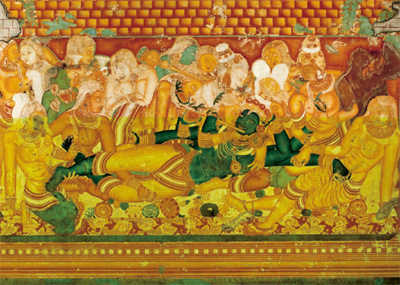
Krishna with gopis.
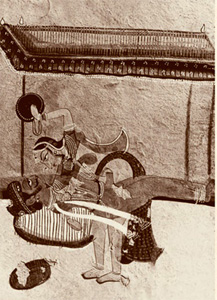
Some kings who are compassionate, take or apply certain medicines to be able to enjoy many wives in one night. Others enjoy only those wives they particularly like, while others take them according to turns. Here the king and his beloved adopt a rather impossible posture.
Some men who are unable to obtain a woman, satisfy their desires by unnatural intercourse with animals like a mare, a she-goat, a bitch; or with an artificial yoni or figure of a woman; and by masturbation.
Clandestine Entry by Men into the Inner Court
The ladies of the royal court use their female attendants to get men disguised as women into their apartments. Those attendants who are acquainted with their secrets, and daughters of their nurses, who are acquainted with their secrets, lure men into the inner court by telling them of their good fortune, describing the ease of entering and departure, the large size of the premises, and the carelessness of the sentinels. But these women should never induce a man to enter the palace by telling him falsehoods, for that may lead to his destruction.
The man himself should be aware of the numerous disasters he may have to face when he enters a royal house, even though it may be easily accessible. He should ascertain that there is an easy way out, check if it is closely surrounded by pleasure gardens, if it has separate enclosures, if the sentinels are careless, and if the king has gone abroad. Then, when he is called by the women of the court, he should very carefully observe the locality, and enter by the way picked out by them.
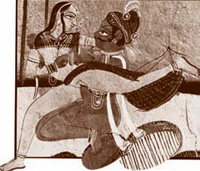
The nayika widens her legs apart to accommodate her lover's huge lingam.
If he can, he should hang around the palace every day, make friends with the sentinels, and show his closeness to the court's female attendants, who may know of his design, and express his regret to them at not being able to obtain the object of his desire. He should leave it to them to arrange a go-between, who has access to the inner court, and he should be careful about recognizing the king's emissaries.
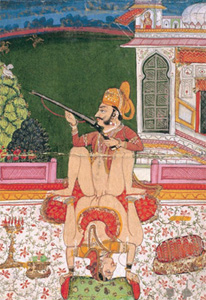
This fancy and acrobatic posture was probably devised by the artist to amuse the king and praise his abilities both in the fields of hunting and lovemaking.
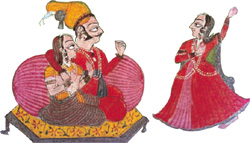
A royal couple embraces and enjoys the dancer's performance.
If the go-between has no access to the court, he should stand in a place where the lady he loves and whom he is anxious to enjoy, can be seen. If that place is occupied by the king's sentinels, he should go there disguised as a female attendant of a lady who visits the place. When she looks at him he should let her know his feelings by signs and gestures, show her pictures, things with double meanings, chaplet of flowers, and rings. He should take careful note of her response by word or sign or gesture, and then try and get into the palace. If he is certain of her coming to a particular place, he should conceal himself there, and at the appointed time, enter with her as one of the guards. He may also go in and out, concealed in a folded bed, or bed covering, or with his body made invisible by means of external applications. A recipe for one of these is: to burn the heart of nakula, an inchneumont, the fruit of the tumbi, long gourd, and the eyes of a serpent without letting out smoke. The ashes are then ground and mixed with water in equal quantities and by putting this on the eyes a man may go about unseen. Other means of invisibility are prescribed by Duyana Brahmans and tantrics.

Lovers adopt a rhythmic and sporty approach to their love play with their elegant dance like movements.
Again he may enter the inner court during the festival of the eighth moon in the month of Margashirsha, and during the moonlight festivals when the female attendants are all busy or distracted.
The following principles are laid down: the entrance and exit of young men into palaces generally take place when things are being brought in and out of the palace, during drinking festivals when the female attendants are in a hurry, when the residence of some royal ladies is being changed, when the king's wives go to gardens, or to fairs, and enter the palace on their return, or lastly, when the king is away on a long pilgrimage. The women of the royal palace know each other's secrets, and having a common object, they assist each other. A young man who enjoys all of them, and who is common to them all, can continue enjoying his union with them so long as it is kept a secret.
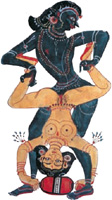
Lovers adopt a rhythmic and sporty approach to their love play with their elegant dance like movements.

Varying Customs and Practices in Royal Courts
In the region of the Aparantakas the royal ladies are not well protected, and many young men are brought into the court by women who have access to the royal palace. The wives of the king of Ahira accomplish their object with the palace sentinels who bear the name of Kshatriyas. The royal ladies in the region of Vatsagulmas arrange for suitable men to enter the palace with their female messengers. In Vidharba, the royal sons enter when they please, and enjoy the women, with the exception of their own mothers. In Stri Rajya the queens are enjoyed by their caste-fellows and relations. In Gauda, the royal wives are enjoyed by Brahmins, friends, servants and slaves, and in Sindhudesh, by servants, foster children, and other such persons. In Himavata, adventurous citizens bribe the sentinels and enter the court. In the region of the Vanyas and the Kamyas, Brahmans, with the king's knowledge, enter the court to give flowers to the ladies, converse with them from behind a curtain, and enjoy sexual union. The women in the private apartments of the king of the Prachyas conceal a vigorous young man for every group of nine or ten of them.
Protecting One's Wife
Ancient sages say a king should select men whose freedom from carnal desires is well tested, as palace sentinels. But such men, through fear or avarice, may allow other persons to enter. Therefore, Gonikaputra states that kings should place such men whose freedom from fears and avarice also has been well tested. Vatsyayana affirms that people might be admitted under the influence of dharma, and therefore the men selected should not only be free from carnal desires, fear and avarice, but also be unquestionably loyal.
The followers of Brabhravya assert that a man should make his wife associate with a young woman who would tell him others' secrets and about his wife's chastity. But Vatsyayana maintains that since wicked persons are always successful with women, a man should not let his innocent wife be corrupted by the company of a deceitful woman.
The contributing causes of the loss of a woman's chastity are: going to social gatherings; absence of restraint and caution in her relations with other men; continued and long absence of her husband; living in a foreign country; the company of loose women; neglect of her love and feelings by her husband and vying with him.
Some shlokas state:
A clever man, learning from the Shastras the ways of winning over the wives of other people, is never deceived in the case of his own wives. No one, however, should make use of these ways for seducing the wives of others, because they do not always succeed, and, moreover, often cause disasters, and the destruction of dharma and artha. This book which is intended for the good of the people, and to teach them the ways of guarding their own wives, should not be made use of merely for gaining over the wives of others.
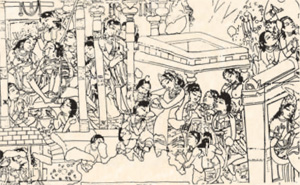
A prince and his royal ladies in a pleasure palace.
